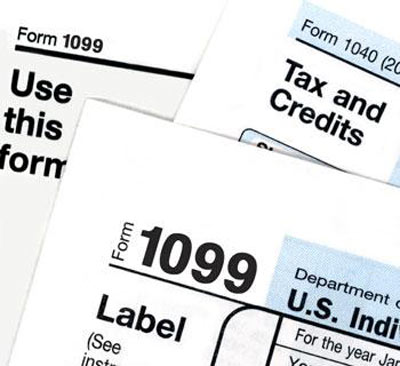
Part of the blizzard of paperwork taxpayers have to deal with each year is the family of 1099 forms. You know: The 1099-INT reports taxable interest to you and to the IRS; the 1099-DIV reports taxable dividends; the 1099-R reports taxable retirement income from an IRA, maybe, or a pension plan; the 1099-MISC, freelance or consulting income.
But not all dollars reported on 1099s should show up on your 1040 form as taxable income. Make sure you don't accidentally report more than you have to.
Take the 1099-G. It's used to report payments from a government, including any state tax refund you received the previous year. Sure, some taxpayers have to pay tax on what they got back. But, in fact, most of us don't. For the 70% or so of taxpayers who claimed the standard deduction last year, that state refund shown on the 1099 is 100% tax free. Even if you itemized, part of the refund can be tax free. There's an easy-to-use worksheet in the instruction packet. Take the time to run through it to protect yourself against an expensive mistake.
The 1099-Q is another potentially misleading form. It reports distributions from a state college saving plan or Coverdell education savings account. But, again, the odds are very, very good that the payout is completely tax free. That's the case if the money was used to pay tuition or other qualifying costs. Tax is due only if you used the money for other purposes, and then tax is due only on earnings, not on the part that represents a return of contributions. Read the instructions carefully before you pay tax on any part of a 1099-Q distribution.
And then there's the 1099-B that brokers send out. This 1099 might actually open the door to a tax-saving loss. This form reports the proceeds of the sale of a stock, mutual fund shares or other assets. But the full amount is never taxable. You get to subtract your "basis" - that's generally what you paid for the asset. If that's more than the proceeds, you have a loss that will offset other taxable income and reduce your tax bill. Sometimes, the 1099-B shows your basis in the asset that was sold; sometimes it doesn't. But in any case, make sure you subtract your basis from the proceeds, so you report only the real profit or real loss on your tax return.
Learn about other costly mistakes made by taxpayers to ensure that you pay as little in taxes as the law allows.
Comment by clicking here.
Kevin McCormally is Editorial Director at Kiplinger Washington Editors.



 Contact The Editor
Contact The Editor
 Articles By This Author
Articles By This Author